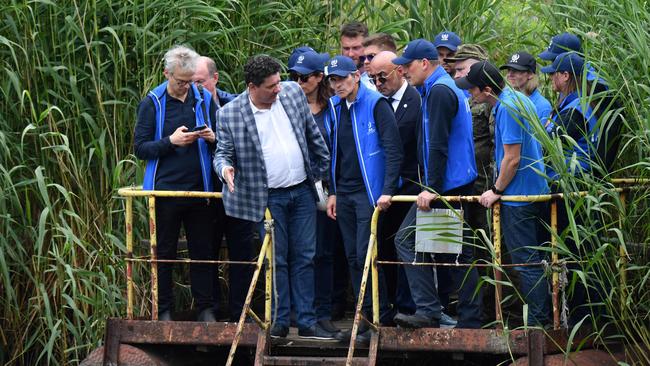UN nuclear chief says situation ‘serious’ at Ukraine plant
NATO accuses Russia of ‘reckless and dangerous’ nuclear rhetoric after it warned the conflict could trigger a third world war.

UN nuclear chief Rafael Grossi said on Thursday that the situation at the Moscow-occupied Zaporizhzhia atomic power plant in Ukraine was “serious” but being stabilised as Kyiv reported progress in its counteroffensive.
The visit to the plant by the director-general of the International Atomic Energy Agency came as the head of NATO accused Russia of “reckless and dangerous” nuclear rhetoric after President Vladimir Putin warned again this week that the conflict in Ukraine could trigger a third world war.
“Russia must know that a nuclear war can never be won and must never be fought,” NATO secretary-general Jens Stoltenberg said as defence ministers from the Western military alliance gathered for a meeting in Brussels.
The alliance is expected to offer Kyiv an upgraded relationship through the creation of a Ukraine-NATO Council next month. The deal falls some way short of membership, but Ukraine would be a “full-fledged” participant at a council table rather than being invited only for special discussions, as is the case now. It would be able to call for meetings and give direct briefings on the latest battlefield situation, as part of a deeper co-operation with NATO involving joint exercises, intelligence sharing and defence investment.
There are also plans to bring Ukraine’s armed forces into line with NATO standards. “It would signal a shift and would enhance NATO’s relationship with Ukraine. I think it would being benefits to both sides,” said Julianne Smith, the US ambassador to the alliance.
Mr Putin said on Tuesday that continued supplies of Western weapons to Ukraine risked triggering a nuclear conflict with the US, with Belarusian President Alexander Lukashenko adding that he had no doubt his Kremlin ally would follow through on the threat “if he is put up against a wall or forced into a corner and there is no other way out”.
Sergey Karaganov, a senior figure at Russia’s council on foreign and defence policy, added to rising tensions by declaring that Washington would not retaliate if Moscow “hit a bunch of targets” in Europe because it would be unwilling to risk seeing its own cities destroyed in a nuclear war.
Mr Stoltenberg responded: “We are, of course, closely monitoring what Russia is doing. So far we haven’t seen any changes in their nuclear posture that requires changes in our nuclear posture. But at the same time what we see is part of a pattern where Russia has invested heavily in new modern nuclear capabilities and also deployed more nuclear capabilities, including close to NATO borders.”
Fears for Europe’s biggest nuclear plant, which have persisted throughout Moscow’s Ukraine offensive, have been exacerbated by the destruction of a dam that provided the cooling water for the plant. Dr Grossi, whose trip was delayed by a day as fighting intensified in the southeastern region of Zaporizhzhia, arrived to assess potential risks. “On the one hand, we can see that the situation is serious, the consequences (of the dam’s destruction) are there, and they are real,” he said. “At the same time, there are measures that are being taken to stabilise the situation.”
Dr Grossi arrived at the plant in a white jeep with the IAEA blue flag attached to it.
He described the trip as “extremely difficult” but “important.” “Until a few hours ago I was not sure whether I would be able to come here and visit the plant,” Dr Grossi said. “Of course, this is a result of increased tension in the area.” He said he was able to see the plant’s cooling pond and “there was sufficient water”.
He also said he wanted the world to be “aware of the danger” that there could be a “major accident.”
Dr Grossi’s third trip to the plant, which fell to Moscow’s forces early in their offensive, came as Ukraine, bolstered with Western weapons and training, pushed its long-awaited effort to force Russian troops off its territory.
On Thursday, Kyiv reported progress in its counteroffensive on the eastern and southern fronts, despite contending with strong resistance from Russian troops. Ukrainian artillery continued to target Russian positions around the frontline hotspot of Bakhmut, in the eastern Donetsk region.
Moscow claimed victory in Bakhmut last month after the longest battle of the war that claimed thousands of lives and left the city in ruins.
“The enemy is pulling up additional reserves and is trying with all its might to prevent the advance of Ukrainian forces,” Ukrainian Deputy Defence Minister Ganna Malyar told a briefing.
Ms Malyar reported an advance of more than 3km in the area of Bakhmut over the past 10 days.
Since the start of the offensive in early June, Ukrainian forces have recaptured seven settlements and more than 100sq km of territory, said Oleksiy Gromov of the Ukrainian armed forces’ general staff.
AFP, The Times



To join the conversation, please log in. Don't have an account? Register
Join the conversation, you are commenting as Logout